Renault Espace VS Toyota Proace Bus – Specs, Efficiency & Price Comparison
Which model is the better choice – the Renault Espace or the Toyota Proace Bus? We compare performance (200 HP vs 177 HP), boot capacity (692 L vs 0 L), efficiency (4.90 L vs 24.20 kWh7.30 L), and of course, the price (37500 £ vs 31600 £).
Find out now which car fits your needs better!
The Renault Espace (SUV) is powered by a Full Hybrid engine and comes with a Automatic transmission. In comparison, the Toyota Proace Bus (Bus) features a Electric or Diesel engine and a Automatic or Manuel gearbox.
When it comes to boot capacity, the Renault Espace offers 692 L, while the Toyota Proace Bus provides 0 L – depending on what matters most to you. If you’re looking for more power, you’ll need to decide whether the 200 HP of the Renault Espace or the 177 HP of the Toyota Proace Bus suits your needs better.
There are also differences in efficiency: 4.90 L vs 24.20 kWh7.30 L. In terms of price, the Renault Espace starts at 37500 £, while the Toyota Proace Bus is available from 31600 £.
Compare all the key specs now and find out which model fits your lifestyle best!
Renault Espace
The Renault Espace is a testament to innovative design, combining versatility with comfort to offer a unique driving experience. Its sleek exterior is complemented by a spacious interior, designed to cater to the needs of families and adventurers alike. With advanced technology and a focus on safety, the Espace seamlessly blends practicality with modern sophistication, making it a standout choice in the MPV segment.
details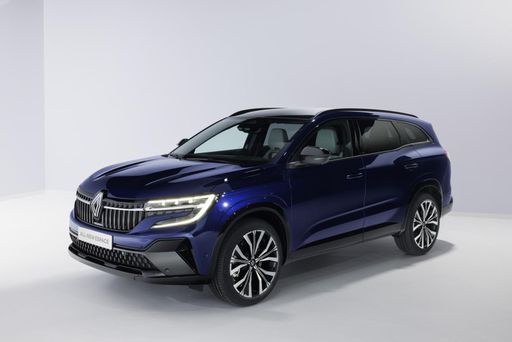 @ Renault
@ Renault
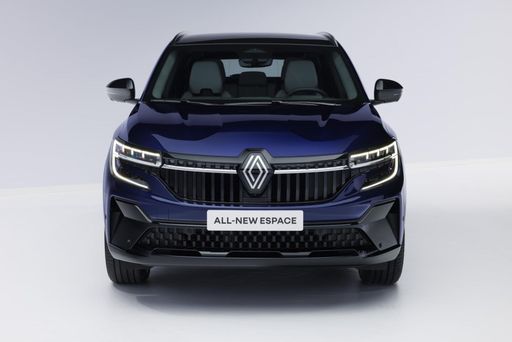 @ Renault
@ Renault
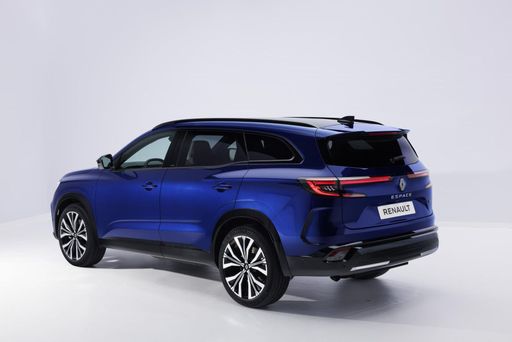 @ Renault
@ Renault
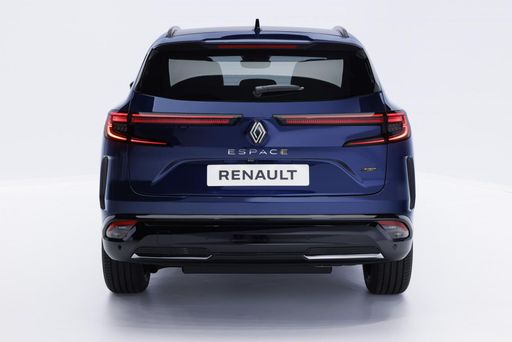 @ Renault
@ Renault
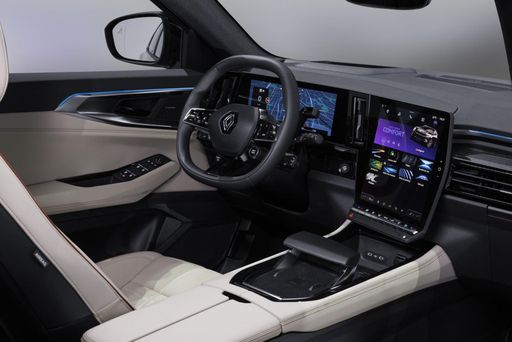 @ Renault
@ Renault
Toyota Proace Bus
The Toyota Proace Bus offers a versatile and practical solution for those in need of spacious passenger transport combined with a touch of comfort. Its interior is designed to maximise seating capacity while ensuring that both driver and passengers can enjoy a pleasant journey. With its efficient engine options and reliable build quality, this vehicle remains a popular choice for families and businesses alike.
details

|
|
|
|
|
Costs and Consumption |
|
|---|---|
|
Price
37500 - 41400 £
|
Price
31600 - 61800 £
|
|
Consumption L/100km
4.90 L
|
Consumption L/100km
7.3 - 7.4 L
|
|
Consumption kWh/100km
-
|
Consumption kWh/100km
24.2 - 24.4 kWh
|
|
Electric Range
-
|
Electric Range
218 - 343 km
|
|
Battery Capacity
-
|
Battery Capacity
-
|
|
co2
110 g/km
|
co2
0 - 193 g/km
|
|
Fuel tank capacity
55 L
|
Fuel tank capacity
69 L
|
Dimensions and Body |
|
|---|---|
|
Body Type
SUV
|
Body Type
Bus
|
|
Seats
5 - 7
|
Seats
5 - 9
|
|
Doors
5
|
Doors
4 - 5
|
|
Curb weight
1673 - 1783 kg
|
Curb weight
1835 - 2140 kg
|
|
Trunk capacity
212 - 692 L
|
Trunk capacity
0 L
|
|
Length
4746 mm
|
Length
4983 - 5333 mm
|
|
Width
1830 mm
|
Width
1920 mm
|
|
Height
1645 mm
|
Height
1890 mm
|
|
Payload
404 - 581 kg
|
Payload
825 - 1265 kg
|
Engine and Performance |
|
|---|---|
|
Engine Type
Full Hybrid
|
Engine Type
Electric, Diesel
|
|
Transmission
Automatic
|
Transmission
Automatic, Manuel
|
|
Transmission Detail
Automatikgetriebe
|
Transmission Detail
Schaltgetriebe, Automatikgetriebe
|
|
Drive Type
Front-Wheel Drive
|
Drive Type
Front-Wheel Drive
|
|
Power HP
200 HP
|
Power HP
136 - 177 HP
|
|
Acceleration 0-100km/h
8.80 s
|
Acceleration 0-100km/h
13.30 s
|
|
Max Speed
174 km/h
|
Max Speed
130 - 170 km/h
|
|
Torque
-
|
Torque
260 - 400 Nm
|
|
Number of Cylinders
3
|
Number of Cylinders
4
|
|
Power kW
147 kW
|
Power kW
100 - 130 kW
|
|
Engine capacity
1199 cm3
|
Engine capacity
1997 cm3
|
General |
|
|---|---|
|
Model Year
2025
|
Model Year
2024 - 2025
|
|
CO2 Efficiency Class
C
|
CO2 Efficiency Class
A, G
|
|
Brand
Renault
|
Brand
Toyota
|
Renault Espace
A New Era for the Renault Espace
The Renault Espace, a staple in the automotive industry, has evolved to embrace a bold new direction with its latest iteration. With its transition into a sleek and stylish SUV, the Espace continues to offer the versatility and innovation that customers expect from the renowned French automaker. This article delves into the advanced technical details and groundbreaking innovations of the current Renault Espace model.
Powertrain Engineering: Full Hybrid Brilliance
The core of the latest Renault Espace is its sophisticated E-Tech Full Hybrid technology. At the heart of this system lies a dynamic three-cylinder engine paired with electric motor support, generating a robust 200 PS. This ensures that drivers experience both power and efficiency in their journeys. The hybrid engine achieves remarkable fuel economy, consuming just 4.7 L/100km, and demonstrates Renault’s commitment to environmental responsibility with a CO2 output of just 107 g/km, earning it a classification of CO2 efficiency class C.
Design and Dimensions: Spacious Comfort in an SUV Shell
Renault’s transformation of the Espace into an SUV doesn’t compromise on its title hinting towards ample interior space. With seating configurations for either five or seven passengers, the Espace adapts to diverse family needs. The SUV's dimensions—4,722 mm in length, 1,843 mm in width, and 1,645 mm in height—ensure that it stands out both aesthetically and functionally on the road.
The generous boot capacity ranges from 159 to 581 litres, allowing it to accommodate everything from daily groceries to larger travel luggage with ease. The five-door design further enhances its practicality, making the loading and unloading process a breeze.
Performance and Drivability: A Smooth Journey
The Renault Espace offers impressive performance metrics, accelerating from 0-100 km/h in a commendable 8.8 seconds. Despite its size, the Espace maintains a commendable top speed of 174 km/h, ensuring that it is as capable on highways as it is in an urban environment. The front-wheel drive system, paired with an automatic gearbox, provides a seamless driving experience—ideal for both city commutes and longer road trips.
Interior Comfort and Technology: A Hub of Innovation
Renault’s focus on creating a comfortable and technologically advanced cabin is evident in the Espace. The choice of various trims—Esprit Alpine Multi-Mode Automatik and Iconic Multi-Mode Automatik—offers luxury and personalisation. Modern technology is integrated throughout the vehicle, with intuitive infotainment options that keep all passengers connected and entertained.
Value for Money: A Competitive Edge
The Renault Espace positions itself competitively in the market with its starting price range from €43,800 to €48,300. Such pricing reflects its status as a premium vehicle that offers cutting-edge hybrid technology, elegant design, and versatile functionality.
With its blend of performance, technology, and space, the Renault Espace remains an outstanding option for families and individuals alike, looking to embrace innovative motoring in the SUV segment.
Toyota Proace Bus
The Versatile Companion: Toyota Proace Bus
The Toyota Proace Bus stands out in the competitive MPV segment, offering a blend of practicality, efficiency, and innovative technology. Toyota has crafted this vehicle to cater to a wide array of needs, whether it be family outings, business transport, or electric motoring. Let's delve into the technical details and innovations that make the Toyota Proace Bus a compelling choice.
Engineering Excellence: Diesel and Electric Variants
The Proace Bus provides several powertrain options to meet diverse requirements. Customers can choose between robust diesel engines or an innovative electric drive system. Diesel variants feature a 2.0 D-4D engine available in various outputs, from 144 PS to 177 PS, supporting both manual and automatic gear options. The diesel engines deliver a balanced performance, with fuel consumption ranging between 7.3 to 7.4 L/100km.
On the electric front, the Proace Electric offers an enticing prospect for eco-conscious drivers. Equipped with a battery capacity of up to 75 kWh, this variant ensures a respectable range of up to 343 km on a single charge, while consuming between 24.2 to 24.4 kWh/100 km. The electric model delivers 136 PS, making it ideal for smooth urban driving.
Interior Innovation: Comfort Meets Functionality
The Toyota Proace Bus impresses with its versatile interior, accommodating 5 to 9 passengers comfortably. Various seating configurations are available depending on the version and needs, making it a perfect solution for both large families and shuttle services. Modern technology adorns the cabin, with a focus on comfort and connectivity, ensuring all passengers travel in style and enjoy seamless connectivity options.
Safety Features and Driver Assistance Technologies
Safety is paramount in the Proace Bus, featuring a plethora of driver assistance systems designed to protect both passengers and pedestrians. Advanced features include parking assistance, lane departure warning, and adaptive cruise control, providing peace of mind during long journeys.
Efficiency and Environmental Considerations
Balancing performance with environmental responsibility, the Proace Bus range includes models that meet various CO2 efficiency classes from A to G. The electric variant notably achieves zero CO2 emissions, making it an excellent choice for sustainable mobility. Furthermore, innovations in aerodynamics and weight management contribute to the Proace Bus's commendable efficiency metrics.
Conclusion: A Dynamic Choice for Modern Needs
The Toyota Proace Bus exemplifies Toyota's commitment to versatility, efficiency, and innovation. With its broad range of engine options, seating configurations, and state-of-the-art technologies, it serves multiple purposes while keeping operational costs in check. Whether for family, business, or eco-friendly motoring, the Proace Bus is a formidable contender in today's automotive landscape.
The prices and data displayed are estimates based on German list prices and may vary by country. This information is not legally binding.
